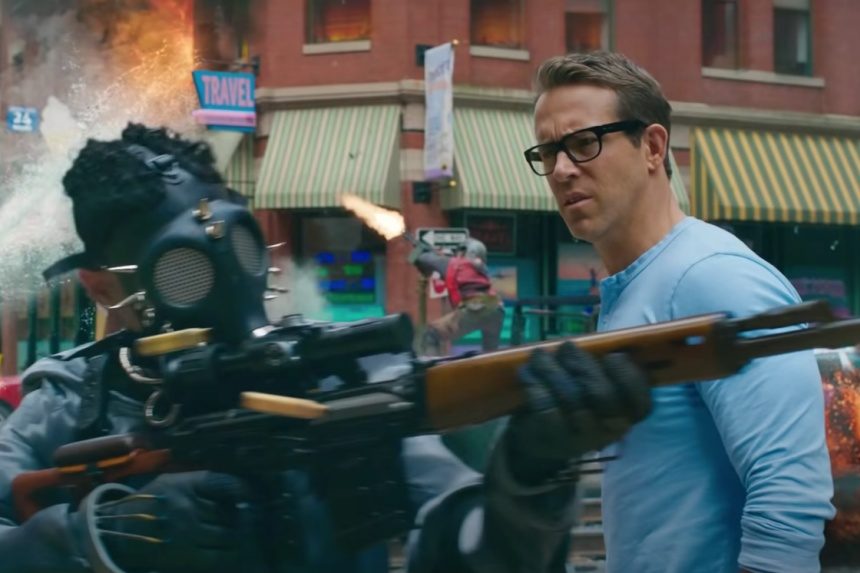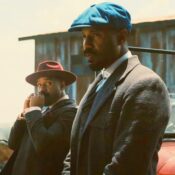Free Guy
⭐⭐⭐⭐
Run Time: 1 hour 55 minutes
Rating: PG-13
Stars: Ryan Reynolds, Jodie Comer, Taika Waititi
Writers: Matt Lieberman and Zak Penn
Director: Shawn Levy
You will not have a better time at the movies — and by that I mean at a mammoth-screened, black-walled, well-attended movie theater — than with Free Guy, a spectacularly playful technofable that, with every passing minute, makes you exponentially more glad you came.
It helps considerably that besides enlisting a hopelessly appealing cast (led by Ryan Reynolds and Jody Comer) and meticulous direction by Shawn Levy (TV’s Stranger Things), screenwriters Matt Lieberman and Zak Penn copiously — and gleefully — crib from some of the most crowd pleasing films of all time, including Groundhog Day, The Truman Show, Tron, What About Bob? and The Matrix…not to mention Penn’s own Ready Player One and Reynolds’s own Deadpool.
In other words, if you’re not having fun watching Free Guy, don’t demand your money back — insist that someone call 911.
The plot of Free Guy is so elevator pitch-friendly you could spit it out before reaching the second floor: An anonymous video game background character, known only as “Guy,” not only becomes self-aware, but also begins to long for a more meaningful existence. What’s more, Guy finds himself smitten with a real human player whose in-game avatar is a sexy, leather-clad woman who passes him one day on a virtual city sidewalk.
Guy’s “job” is ostensibly as a bank teller, but really he just stands behind a counter waiting for the daily stream of avatars who pour through the door, guns blazing, to hold up the place. You see, the game, called Free City, is a digital place where players can become violent criminals and live out their fantasies of murder and mayhem. (One of the film’s amusing/alarming elements is its frequent cuts to young kids, controllers in hand, feverishly masterminding the most awful of digital crimes.)
Like his fellow background characters, however, Guy has been programmed to be endlessly cheerful and optimistic — how else could anyone endure an existence that involves being attacked ad infinitum? And he can’t help but notice there’s something different about that mysterious woman, who goes by the name Molotov Girl. Not only is she acting strangely non-violent; she’s actually nice to Guy. What more could a fellow want in a woman?
It turns out Molotov Girl is actually an avatar for a real-world woman named Millie, who along with a fellow programmer named Keys (Joe Keery), created the initial program for Free City, infusing their characters with sprightly spirits — and, it turns out, an emerging humanity. Their boss, Antoine (Taika Waititi), a vacuous entrepreneur, has perverted the pair’s good-natured original program into a soulless channel of relentless violence, with the background characters as perpetual punching bags. In the guise of Molotov Girl, Millie is roaming Free City’s scorched landscape searching for digital evidence that Antoine has stolen that initial creation, but now she has discovered something far more momentous: The pair’s digital creations are becoming self-aware.
Reynolds, an actor who has plumbed bottomless reservoirs of goodwill playing engaging wild men in films like Deadpool and The Hitman’s Bodyguard, manages to be both syrupy sweet and dangerously edgy. Guy is without question a direct descendant of Jim Carrey’s Truman and Bill Murray’s Phil Connors, but he’s a delight to watch in his own right as Guy emerges from a one-dimensional bit player to the star of his own life. Comer, asked to do little more than react to Guy’s programmed awakening, nicely embodies Millie’s two personas: The digital superwoman and the mild-mannered desk jockey who is desperately trying to save the world she created.
It is Millie’s mission that provides Free Guy’s more surprisingly powerful subtext. Yes, there’s the expected catharsis (tipped in the movie’s trailers) in which Guy realizes being “real” means living in the moment and sharing the experience of humanity — and so I guess we can add Pinocchio to the film’s list of source materials. But Millie comes away with perhaps the more significant revelation: That it’s not enough just to create a world, or a city, or a society, or a relationship — it’s stewardship of that creation that is not only the hard part, but ultimately the most essential.
Ablaze with immersive special effects and paced like a high-speed roller coaster, Free Guy makes no apologies for being a late-summer thrill ride. Go ahead — stick your hands and feet outside the vehicle. It’s all virtual, after all.
Featured image: Scene from Free Guy (20th Century Studios)
Become a Saturday Evening Post member and enjoy unlimited access. Subscribe now



